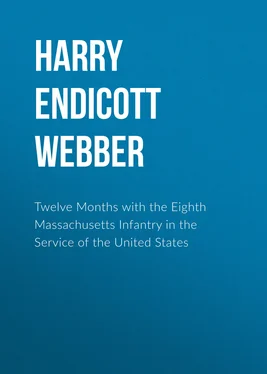Harry Endicott Webber - Twelve Months with the Eighth Massachusetts Infantry in the Service of the United States
Здесь есть возможность читать онлайн «Harry Endicott Webber - Twelve Months with the Eighth Massachusetts Infantry in the Service of the United States» — ознакомительный отрывок электронной книги совершенно бесплатно, а после прочтения отрывка купить полную версию. В некоторых случаях можно слушать аудио, скачать через торрент в формате fb2 и присутствует краткое содержание. Жанр: foreign_prose, История, foreign_edu, foreign_antique, на английском языке. Описание произведения, (предисловие) а так же отзывы посетителей доступны на портале библиотеки ЛибКат.
- Название:Twelve Months with the Eighth Massachusetts Infantry in the Service of the United States
- Автор:
- Жанр:
- Год:неизвестен
- ISBN:нет данных
- Рейтинг книги:5 / 5. Голосов: 1
-
Избранное:Добавить в избранное
- Отзывы:
-
Ваша оценка:
- 100
- 1
- 2
- 3
- 4
- 5
Twelve Months with the Eighth Massachusetts Infantry in the Service of the United States: краткое содержание, описание и аннотация
Предлагаем к чтению аннотацию, описание, краткое содержание или предисловие (зависит от того, что написал сам автор книги «Twelve Months with the Eighth Massachusetts Infantry in the Service of the United States»). Если вы не нашли необходимую информацию о книге — напишите в комментариях, мы постараемся отыскать её.
Twelve Months with the Eighth Massachusetts Infantry in the Service of the United States — читать онлайн ознакомительный отрывок
Ниже представлен текст книги, разбитый по страницам. Система сохранения места последней прочитанной страницы, позволяет с удобством читать онлайн бесплатно книгу «Twelve Months with the Eighth Massachusetts Infantry in the Service of the United States», без необходимости каждый раз заново искать на чём Вы остановились. Поставьте закладку, и сможете в любой момент перейти на страницу, на которой закончили чтение.
Интервал:
Закладка:
In the afternoon, Governor Wolcott and some of his staff visited the camp to present the officers with their commissions in the United States service. After passing in review before His Excellency, the Regiment formed three sides of a hollow square, with officers in the center. The Governor and his party formed a fourth side. The square was surrounded by friends of the Regiment, who covered half of the great parade ground. The remarks of His Excellency were deeply impressive, and at times he visibly showed the emotion which he felt. In a voice audible to everyone on the field, Governor Wolcott said:—
"Men of Essex and Middlesex:—Two days ago your parting cheers made sweet music in the ears of your comrades of the Second Regiment as they left the Commonwealth in the high service of the United States of America. Today you obey the same summons, and are ready, as they were, to endure hardship and suffering in the same exalted cause.
Your cause, men of Massachusetts, is a just and righteous one. I greatly misread the heart of this great nation if the historian of the future shall not record that this war was entered upon by a mighty and free people, who had heard, as long as they could endure them, the sighs and groans of an oppressed neighboring population, bending beneath the tyranny of a nation of the old world.
It is to set free the oppressed and to bind up their wounds that you now enter the service of the United States. You will find yourselves shoulder to shoulder with the men of other states. Let there be no other rivalry than generous emulation, that you shall show that the men of Massachusetts, where valor calls for sacrifice, or where the duty of the soldier calls for prompt obedience and good discipline, are second to the sons of no other Commonwealth and no other State in the United States of America.
You leave with the prayers and the confidence of the people of this Commonwealth. Officially, as the Governor of the Commonwealth, I bid you Godspeed! And may the God of battles bring you victory and an honorable peace!
It is now my privilege and honor to present to the officers of the Eighth Massachusetts Infantry, United States Volunteers, the commissions under which they enter the service of the United States."
After presenting the commissions, Governor Wolcott said:—
"Colonel Pew:—You have a regiment worthy of the Commonwealth of Massachusetts and of the service of the United States of America."
The following officers received their commissions from Governor Wolcott on this occasion:—
Colonel—William A. Pew, Jr. of Salem.
Lieutenant Colonel—Edwin W. M. Bailey of Amesbury.
Majors—William Stopford of Beverly; Frank A. Graves of Marblehead; Edward H. Eldredge of Boston.
Adjutant—Lieutenant Thomas D. Barrol of Boston.
Quartermaster—Lieutenant Charles F. Wonson of Gloucester.
Surgeon—Major William Cogswell of Salem.
Assistant Surgeons—Lieutenant Thomas L. Jenkins of Topsfield; Lieutenant Frank P. T. Logan of Gloucester.
Chaplain—Rev. George D. Sanders of Gloucester.
Company A, Newburyport—Captain, Alexander G. Perkins; First Lieutenant, George W. Langdon; Second Lieutenant, George H. Dow.
Company B, Amesbury—Captain, Horace S. Bean; First Lieutenant, John M. Pettingill; Second Lieutenant, Frank Stinson.
Company C, Marblehead—Captain, Frank B. Denning; First Lieutenant, Linville H. Wardwell; Second Lieutenant, Frederic P. Smith.
Company D, Lynn—Captain, Charles T. Hilliker; First Lieutenant, Thomas J. Coby; Second Lieutenant, William F. Young.
Company E, Beverly—Captain, Frederick W. Stopford; First Lieutenant, Charles H. Farnham; Second Lieutenant, Francisco A. DeSousa.
Company F, Haverhill—Captain, William C. Dow; First Lieutenant, Per Justus Swanberg; Second Lieutenant, David E. Jewell.
Company G, Gloucester—Captain, Edward J. Horton; First Lieutenant, Charles M. McIsaac; Second Lieutenant, James C. Nutt.
Company H, Salem—Captain, Walter P. Nichols; First Lieutenant, George N. Jewett; Second Lieutenant, Augustus G. Reynolds.
Company I, Lynn—Captain, John E. Williams; First Lieutenant, Francis H. Downey; Second Lieutenant, William H. Perry.
Company K, Danvers—Captain, A. Preston Chase; First Lieutenant, Henry W. French; Second Lieutenant, Stephen N. Bond.
Company L, Lawrence—Captain, James Forbes; First Lieutenant, James H. Craig; Second Lieutenant, Roland H. Sherman.
Company M, Somerville—Captain, Herbert W. Whitten; First Lieutenant, George I. Canfield; Second Lieutenant, Frederick W. Pierce.
From May 14th to May 16th the Regiment waited, uncertain when its train transportation would arrive. Shortly after noon on the 16th, camp was struck. It was a damp and dreary day. There was no large crowd to cheer their departure, as the home stations of the companies were too remote, and the movement too sudden for the friends of the regiment to see them off. Late in the afternoon the regiment passed in review before Governor Wolcott, and took up its line of march for the railroad station. There it was quickly embarked in three sections. Each battalion had a section consisting of eleven cars, one for baggage, one for guard quarters, and two for each company. A Wagner sleeper was furnished on each section for the accommodation of the officers. The first section pulled out of the station at South Framingham at 6 o'clock, followed shortly afterwards by the others. The last section left at 6.30. The three sections carried 47 officers and 896 men.
Chickamauga
The route of the regiment to Chickamauga was through the valleys of the Hudson and Shennandoah. The cities of New York, Philadelphia, Baltimore, Washington and Knoxville, were seen in passing, but stops were only made to allow the officers to obtain meals for themselves and coffee for the men. The Government furnished travel rations for the men consisting of hard tack, canned corned beef, beans and tomatoes, and a money allowance for coffee. In their year of service, no one in the regiment ever discovered a use for canned tomatoes as a travel ration.
During the trip hard tack circulated as souvenirs among the girls at the various stops, usually inscribed with the donor's name and address, and given in exchange for pieces of ribbon and other feminine favors. Enthusiastic crowds were in evidence at all the stations, where they gathered to see the troop trains pass. The men were confined to the cars, but managed to carry on many flirtations and make exchanges through the windows. Every day they were taken out at some stop for a run around or a bit of setting up exercise, and once the Third Battalion took advantage of a mountain stream for bathing purposes.
On the morning of May 19th the regiment awoke to find itself in the Citico Freight Yard, just outside the city of Chattanooga, together with other troop trains containing the men of the Twelfth New York, and the Twenty-First Kansas, with whom the regiment subsequently brigaded. After spending a day in the freight yard, the sections began late in the afternoon to slowly travel the fourteen miles between Chattanooga and Chickamauga Park. At Battle Station the battalions disembarked, the baggage was piled near the track and left under guard, while the regiment enjoyed its first bivouac on a neighboring hill.
The Colonel reported to General Brooke and was told that a camp site would be assigned and transportation for the baggage furnished the following day.
Chickamauga Park is a National Reservation in the northwestern corner of the State of Georgia, embracing some ten squares miles of territory, and commemorates the battle which was fought there in 1863. The park is wooded, with here and there open fields. Much of the underbrush had been cleared away, and good dirt roads constructed by the Government. The water supply consisted of a few dozen wells, which had supported a small farming population before the Government purchased the land. The soil is clayey above a limestone formation, which frequently outcrops and renders digging difficult. The months of May and June are liable to be pleasant and dry, but in July and August, abundant rain turns the ground where vegetation is worn off, into a mire of sticky mud. On one side, the Park is bounded by Chickamauga Creek, meaning in the Indian tongue, "The River of Death", and into this creek the whole surface of the Park drains. The Government intended to organize on this ground the First, Third and Sixth Army Corps, and at one time assembled about 55,000 men for this purpose. The camp was named, Camp George H. Thomas, in honor of the gallant soldier who rendered conspicuous service to the Federal cause in the battle of Chickamauga.
Читать дальшеИнтервал:
Закладка:
Похожие книги на «Twelve Months with the Eighth Massachusetts Infantry in the Service of the United States»
Представляем Вашему вниманию похожие книги на «Twelve Months with the Eighth Massachusetts Infantry in the Service of the United States» списком для выбора. Мы отобрали схожую по названию и смыслу литературу в надежде предоставить читателям больше вариантов отыскать новые, интересные, ещё непрочитанные произведения.
Обсуждение, отзывы о книге «Twelve Months with the Eighth Massachusetts Infantry in the Service of the United States» и просто собственные мнения читателей. Оставьте ваши комментарии, напишите, что Вы думаете о произведении, его смысле или главных героях. Укажите что конкретно понравилось, а что нет, и почему Вы так считаете.












